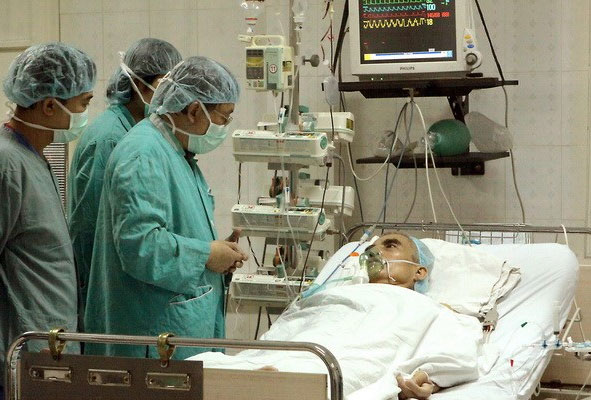Super cooling technology offers hope for organ transplant patients
A new "super cooling" technique can keep the liver of "living" mice outside the body three times longer than before, increasing the hope of mitigating the shortage of organs for transplant surgeries. organs.
This is the research result of a group of international scientists published in the Journal of Natural Medicine on June 29.
Specifically, in the new 3-step liver preservation technology, an infusion machine is used to provide oxygen liver, nutrients and protective compounds before they are cooled at -6 ° C. , and are submerged in the antifreeze storage solution.
After being kept at this temperature for 3-4 days, the temperature will be gradually increased to 4 degrees Celsius, the liver is provided with oxygen and nutrition again before performing organ transplant surgery.
The results showed that all mice that had a "super cooling" liver transplant for 3 days were healthy after 3 months, which was a milestone to assess their ability to continue living after liver transplantation.

In addition, more than half of mice received 96-hour preserved liver to live up to 3 months. Meanwhile, rats with liver transplants preserved by current methods survive only a few hours or days.
According to Korkut Uygun, a scientist at the Center for Medical Applications, Massachusetts Hospital, co-author of the study, this is the longest out-of-body liver preservation time with the highest success of organ transplants. now on.
If this method is used in human organ preservation, the shortage of organs can be relieved and organ transplant surgery can be done globally.
Rosemarie Hunziker, a scientist from the National Institute of Biomedical and Medical Biology (NIBIB), a member of the National Institutes of Health (NIH), said the next step would be to do research. Similar rescue in larger animals. However, the above method should be thoroughly tested and improved before being considered for human use.
NIBIB emphasizes increasing the amount of time that the liver survives outside the body has many benefits, such as having more time to prepare the patient, reducing the logistics in the hospital where there are donors, less count urgently when having to transfer organs to the site of transplantation, expanding the scope of organ donation allows the implementation of transcontinental and intercontinental organ transplant surgeries.
This also increases the chance of finding suitable organs for patients who need organ transplants, as well as reducing surgery costs.
According to the study, in the US alone, about 120,000 people are waiting for organ donation.
- The US approves organ transplants from HIV-infected patients
- First organ transplant for HIV-infected people
- New hope for patients with liver failure
- Disaster of the HIV-infected organ transplant for 5 patients
- What is organ transplantation?
- Inventions that change the future of organ transplantation
- Russian patients turn off hope for a head transplant surgery
- Japanese lung transplant successfully from live donors
- Pig liver transplant for monkeys
- Surprised to see the human heart still beating outside the body while waiting for a transplant
- The first transplant patient will become familiar with the new body with virtual reality
- Can transplant ... kidney and pig heart for humans
 Green tea cleans teeth better than mouthwash?
Green tea cleans teeth better than mouthwash? Death kiss: This is why you should not let anyone kiss your baby's lips
Death kiss: This is why you should not let anyone kiss your baby's lips What is salmonellosis?
What is salmonellosis? Caution should be exercised when using aloe vera through eating and drinking
Caution should be exercised when using aloe vera through eating and drinking